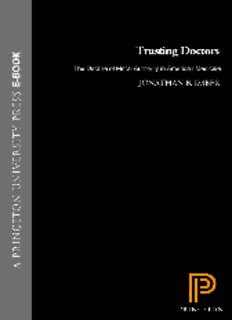
Trusting doctors : the decline of moral authority in American medicine PDF
Preview Trusting doctors : the decline of moral authority in American medicine
TRUSTING DOCTORS This page intentionally left blank T R U S T I N G D O C T O R S The Decline of Moral Authority in American Medicine JONATHAN B. IMBER PRINCETON UNIVERSITY PRESS Princeton and Oxford Copyright © 2008by Princeton University Press Published by Princeton University Press, 41William Street, Princeton, New Jersey 08540 In the United Kingdom: Princeton University Press, 6Oxford Street, Woodstock, Oxfordshire ox20 1tw All Rights Reserved Library of Congress Cataloging-in-Publication Data Imber, Jonathan B., 1952– Trusting doctors : the decline of moral authority in American medicine / Jonathan B. Imber. p. cm. Includes bibliographical references and index. isbn978-0-691-13574-8(hardcover : alk. paper) 1. Medical ethics. 2. Medical policy— Moral and ethical aspects. I. Title. R724.I5446 2008 174.2—dc22 2008005153 British Library Cataloging-in-Publication Data is available This book has been composed in Minion Printed on acid-free paper. ∞ press.princeton.edu Printed in the United States of America 10 9 8 7 6 5 4 3 2 1 To Amy, Elizabeth, and David And to the blessings of family lbjkak chcx oh,hz hk,af lhbc l,hc h,frhc vhrp ipdf l,at This page intentionally left blank All in all there are two things, two remedies—both for internal use—which, regrettably enough, physicians nowadays forget or neglect to prescribe. —Alas, it is all the more regrettable that neither one nor the other is particu- larly easy to manage, even though the physician did remember to prescribe it. One of these, used when everything is safely over—a small dose, a drop is sufficient; too much is detrimental and may even elicit the opposite effect —is jesting, a timely jest, a felicitous fancy, a priceless, surprising something, a droll, jesting incident, a turn of phrase that all of a sudden turns every- thing upside down. . . . In other words, jesting is one; the other, which physi- cians nowadays do not prescribe either, is the pastor. —Søren Kierkegaard to Julie Thomsen, January 1849 Hence too probably the fact that transactions of healing are so closely con- nected, the world over, with sentiments of religion. Perhaps the fact is due, in part, to some latent association that connects diseases with sin and, to much the same extent, connects the hope of healing with some possibility of a divine medication. However this may be, the mystery of healing, as we are constituted, stands in close affinity with God and the faith of his supernatu- ral operation. —Horace Bushnell, Nature and the Supernatural,1858 vii This page intentionally left blank contents preface: A Sociological Perspective xi introduction xvii part one: Religious Foundations of Trust in Medicine 1 Protestantism, Piety, and Professionalism 3 2 The Influence of Catholic Perspectives 22 3 The Scientific Challenge to Faith 43 4 Public Health, Public Trust, and the Professionalization of Medicine 65 part two: Beyond the Golden Age of Trust in Medicine 5 The Growth of Popular Distrust in Medicine 107 6 The Evolution of Bioethics 130 7 Anxiety in the Age of Epidemiology 144 8 Trust and Mortality 167 acknowledgments 197 appendix 1: Extant Addresses, Sermons, and Eulogies by Clergymen 201 appendix 2: Philadelphia Medical Sermons 208 appendix 3: Long Island College Hospital Commencements, 1860–1899 210 notes 213 index 265
Description: